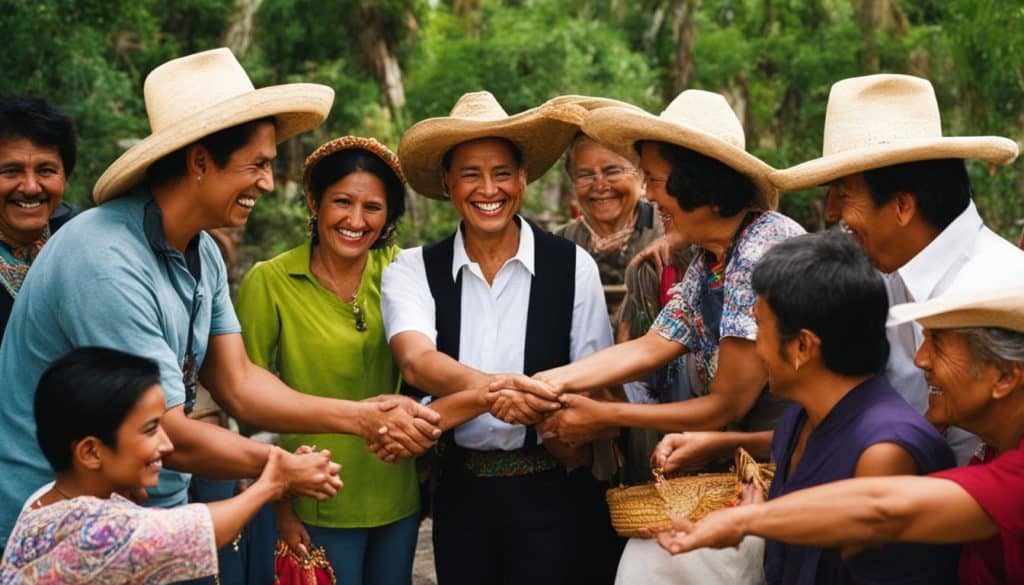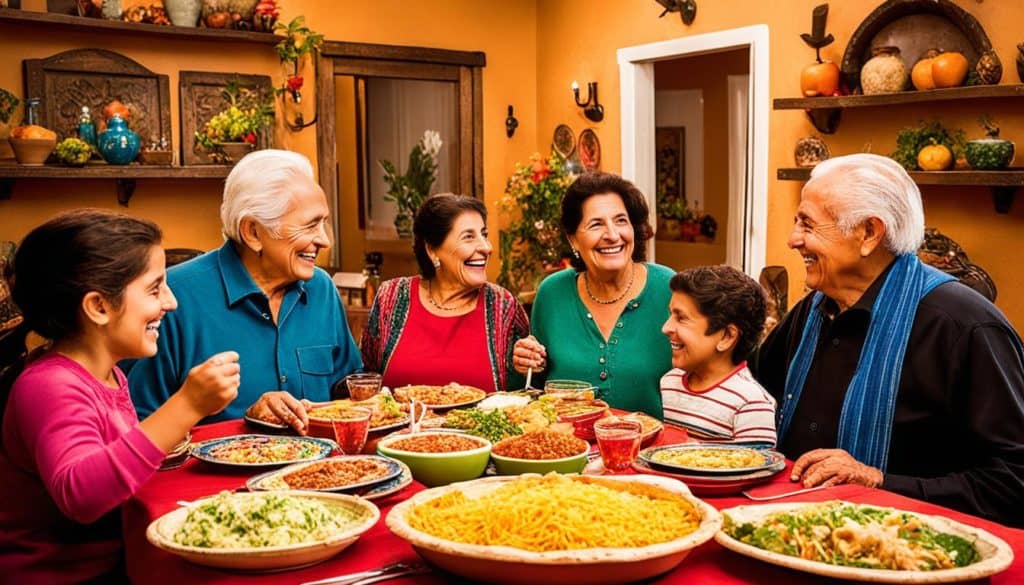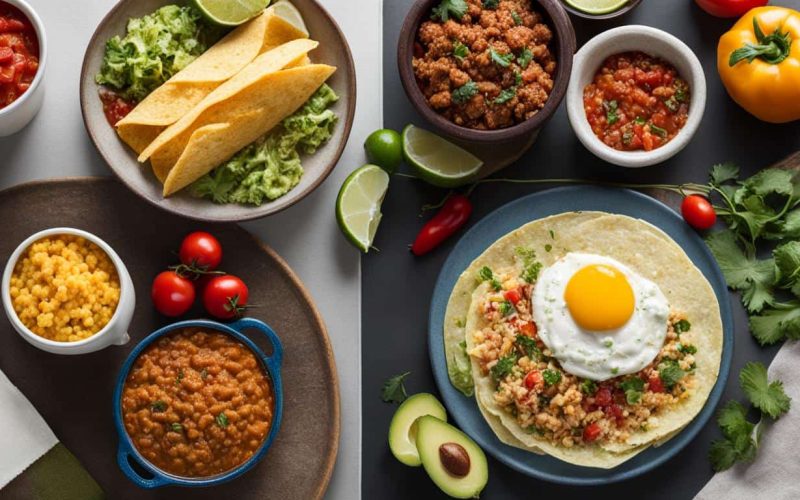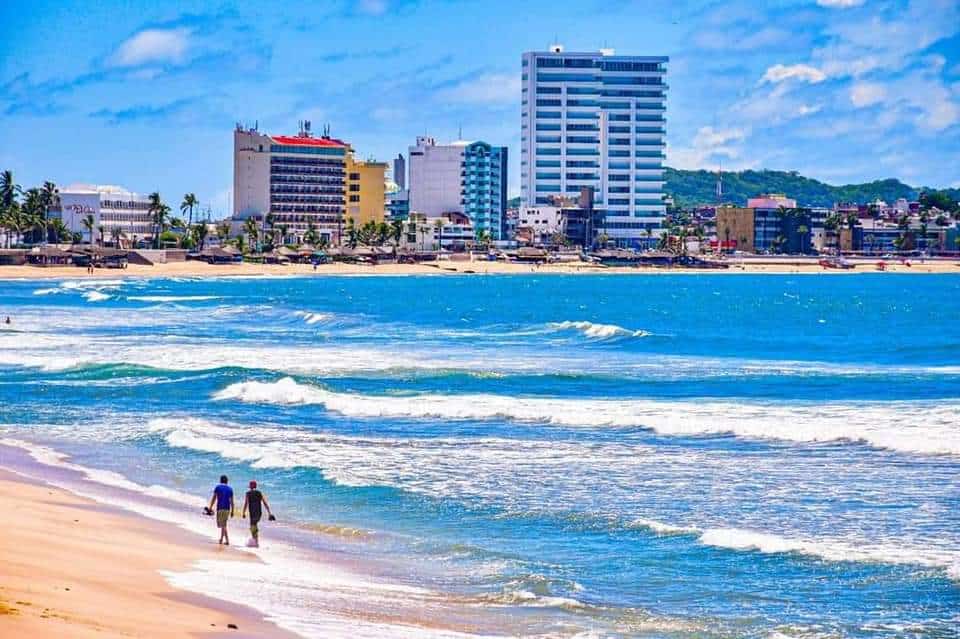Where amazing experiences don’t always run perfectly on schedule, and you learn to love the surprises even more than the plan. I should know – I’ve been a Mazatlan resident for four years, and that “everything will work out eventually” spirit is just one of the major cultural differences between the US and Mexico that you’ll encounter.
Adapting to a new culture can be both exciting and challenging. When traveling or moving to Mexico, understanding the cultural differences between the US and Mexico is essential to avoid culture shock and have a smoother transition. Embracing these differences can also enrich your cross-cultural experiences and deepen your appreciation for diverse cultures.
Key Takeaways:
- Embrace the “everything will work out eventually” spirit and be open to surprises.
- Understanding and adapting to the cultural differences between the US and Mexico can help you avoid culture shock.
- Embracing these differences can enrich your cross-cultural experiences.
- Remember that adapting to a new culture takes time, so be patient and open-minded.
- Seek support and guidance from the local community to navigate the cultural nuances of Mexico.
It’s About Time…Mexican Time
The concept of time in Mexico is often portrayed as “mañana time” or a laidback approach to punctuality. However, it goes beyond laziness and is more about savoring moments and embracing a slower pace of life.
“Yes, there’s ‘mañana time,’ but it’s way more than laziness. It’s about savoring moments, being adaptable, and enjoying life at a slower pace.”
Visitors to Mexico should be prepared to embrace flexibility and go with the flow. Whether it’s a tour running late or a cultural event starting later than scheduled, being adaptable opens up new experiences and connections.
“Go with the flow! If your tour is running late, embrace the opportunity to relax, people-watch, and be flexible. Being adaptable opens up new experiences and connections.”
So, next time you find yourself waiting for an event to start or a tour to begin, take a moment to appreciate the Mexican concept of time.
Embrace the opportunity to relax, people-watch, and enjoy the slower pace of life that Mexico has to offer.
Reading the Signals: It’s More Than Just “Hola”
Communication in Mexico involves more than just saying “Hola.” Mexicans value politeness and may use indirect language to avoid blunt criticism or saying “no” directly. This is done to save face and preserve harmony in relationships.
It’s important to tune into body language and tone, as these can provide additional context to the conversation. Using a gentle approach and being open to different communication styles can foster better communication and understanding.
Decoding Indirectness: “Mexicans value politeness and may soften a ‘no’ or avoid blunt criticism. This is about saving face and preserving harmony in relationships.”
Mexicans value politeness and often express themselves indirectly. Instead of giving a direct “no” or criticism, they may soften their response to preserve harmony and save face. Understanding this cultural nuance is crucial for effective communication in Mexico.

Pro Tip: “Pay attention to body language and tone. If someone seems hesitant, using a gentle approach like ‘Is there a better way?’ can go a long way in fostering open communication.”
Nonverbal communication plays a significant role in Mexican communication style. Paying attention to body language and tone can provide valuable insights into the underlying messages being conveyed.
If someone appears hesitant or uncertain, using a gentle and encouraging approach like “Is there a better way?” can create a safe space for open communication and ensure that the conversation flows smoothly.
| Key Points | Implications |
|---|---|
| Mexicans value politeness | Respecting cultural norms of politeness can strengthen relationships and avoid misunderstandings. |
| Indirect language is common | Being open-minded and attentive to subtle cues can help decipher the intended meaning. |
| Pay attention to body language and tone | Nonverbal cues can provide additional context and help gauge the speaker’s true intentions. |
| Use gentle approaches | Adopting a gentle and encouraging communication style can foster openness and establish trust. |
¡Viva la Familia! The Heart of Mexican Life
Family is at the core of Mexican culture, where strong relationships and a sense of community are highly valued. The Mexican social support system extends beyond the nuclear family, encompassing a network of extended family members and close relationships.
Expect to be part of big, loving gatherings that bring together aunts, uncles, cousins, and the entire family. These gatherings are an opportunity to strengthen bonds and celebrate the importance of family in Mexican life.
One key aspect of Mexican family values is the emphasis on building relationships. As a newcomer, making an effort to attend family events and showing interest in other people’s loved ones is a meaningful way to demonstrate your care and commitment to belonging and building relationships within the community.
Through these interactions, you’ll witness the interconnectedness of the Mexican social fabric and experience firsthand the warmth and support that come from being part of a tight-knit community.

| Key Points |
|---|
| Mexican culture revolves around extended family and close relationships |
| Expect big, loving gatherings that include aunts, uncles, and cousins |
| Making an effort to attend family events shows commitment to building relationships |
| Mexican social support system offers warmth and a sense of belonging |
Fiestas, Flavors & The Soul of Mexico
Forget Cinco de Mayo: Real Mexican celebrations are epic, full of history, and have deep cultural meaning. From Día de Muertos to local saints’ days, immerse yourself in the rich traditions.
Beyond Tacos: Every region in Mexico has unique dishes and flavors to savor. Explore local hole-in-the-wall spots and embrace the Mexican tradition of lingering over meals.
| Fiestas & Festivals | Cultural Significance |
|---|---|
| Día de Muertos (Day of the Dead) | A time to honor and remember departed loved ones with colorful altars, marigolds, and sugar skulls. |
| Guelaguetza | A celebration of indigenous communities showcasing their traditional music, dance, and clothing. |
| Carnaval | A festive pre-Lenten celebration with elaborate parades, costumes, dancing, and music. |

Each region in Mexico boasts a unique culinary heritage:
- Baja California: Fresh seafood, grilled fish tacos, and ceviche.
- Oaxaca: Mole sauces, tlayudas (crispy tortilla topped with beans, cheese, and meat), and mezcal.
- Yucatán Peninsula: Cochinita pibil (slow-roasted pork), papadzules (tortillas stuffed with eggs and pumpkin seed sauce), and fresh fruit agua frescas.
Exploring Mexican food means venturing beyond popular dishes like tacos. Delve into the rich tapestry of regional cuisine by visiting local markets, street food stalls, and family-owned establishments.
Don’t rush your meals; embrace the Mexican tradition of lingering over food, savoring every bite, and enjoying the convivial atmosphere.
Everyday Practicalities (Because Life Happens)
Business Talk:
Building relationships is key in Mexican business culture. Small talk and establishing trust are important before diving into proposals. Learning a few key Spanish phrases can go a long way in building rapport.
Tipping Tidbits:
Tipping is customary in Mexico, but the norms are different from the US. Use a simple guide to avoid confusion and show appreciation for good service.
To ensure that you navigate tipping etiquette appropriately, it is recommended to use a simple guide that outlines the customary tipping practices in Mexico.
Getting Around:
Taxis are negotiable in Mexico, and taking buses can be an adventure. Ask locals or your hotel for insider tips on transportation options and navigating the city.

When conducting business in Mexico, it is crucial to understand the significance of building relationships. In Mexican business culture, small talk and establishing trust are essential before diving into proposals or negotiations. Taking the time to engage in friendly conversation and showing genuine interest in your potential business partners can go a long way in building rapport.
Additionally, learning a few key Spanish phrases can demonstrate your respect for the local culture and make a positive impression. This simple effort shows that you value and acknowledge the importance of Mexican business etiquette.
When it comes to getting around in Mexico, taxis are a common form of transportation. However, it’s important to keep in mind that the fares are often negotiable, so don’t hesitate to engage in friendly negotiation to ensure a fair price.
Additionally, taking buses in Mexico can be an adventure and a great way to immerse yourself in the local culture. To make your commute smoother, it’s advisable to ask locals or your hotel for insider tips on transportation options and navigating the city like a local.
Conclusion
Embracing the Learning Curve: No one becomes an expert in Mexican culture overnight. Embrace the learning curve and be open to making mistakes. Laugh them off and use them as opportunities to grow.
The Deeper Rewards: Understanding Mexico enriches not only your trip but also your life. It broadens your perspective and allows for a deeper appreciation of different cultures.
Your Mexico Companion: If you have questions or need guidance, reach out to the community. We are here to share our love for Mexico and help you navigate this incredible country.
Adapting to a new culture takes time and effort. It’s natural to encounter challenges and make mistakes along the way. Instead of getting discouraged, embrace the learning curve as a valuable part of your cultural journey. Each mistake is an opportunity for personal growth and a chance to deepen your understanding of Mexican culture. Remember, no one expects you to be an expert overnight.
Understanding Mexico goes beyond the surface level of a vacation experience. It allows you to develop a broader perspective on the world and appreciate the differences that make each culture unique. You’ll gain insights into the values, traditions, and history that shape Mexican society, leading to a more profound appreciation for the country and its people.
The journey of cultural adaptation is not one you have to make alone. The Mexican community is here to support and guide you as you navigate this incredible country.
Whether you have questions, need recommendations, or simply want to connect with like-minded individuals, reaching out to the community will provide valuable insights and a sense of belonging. We are passionate about sharing our love for Mexico, and we’re excited to be your Mexico companion.
FAQ: Your Mexico Culture Questions Answered
Time: Mexico has a relaxed “mañana” approach, prioritizing moments over strict schedules.
Communication: Mexicans often use indirect phrasing to soften disagreements and save face.
Family: Large extended families are central in Mexico, offering strong support networks.
Celebration: Festivals in Mexico are deeply tied to history and tradition, fostering rich community ties.
Hospitality: Both cultures place great value on warmth and welcoming guests.
Importance of Religion: Christianity is widely practiced in both the US and Mexico, playing a central role for many families.
Love of Food: Both countries enjoy diverse cuisine and sharing meals together.
Individualism vs. Collectivism: The US prioritizes individual success, while Mexico emphasizes group welfare.
Directness in Communication: Americans tend to be more straightforward, compared to Mexico’s indirectness.
Views on Work: The US typically has a strong work-is-life mentality, while Mexico balances work with enjoying the moment.
Geographic Proximity: Being neighbors shapes trade, travel, and cultural exchange.
Shared History: Both nations have complex histories of influence and interaction.
Primary Language: The US is primarily English-speaking, while Mexico is Spanish-speaking.
Economic Development: The US is a highly developed nation with greater average wealth compared to Mexico, a developing country.










